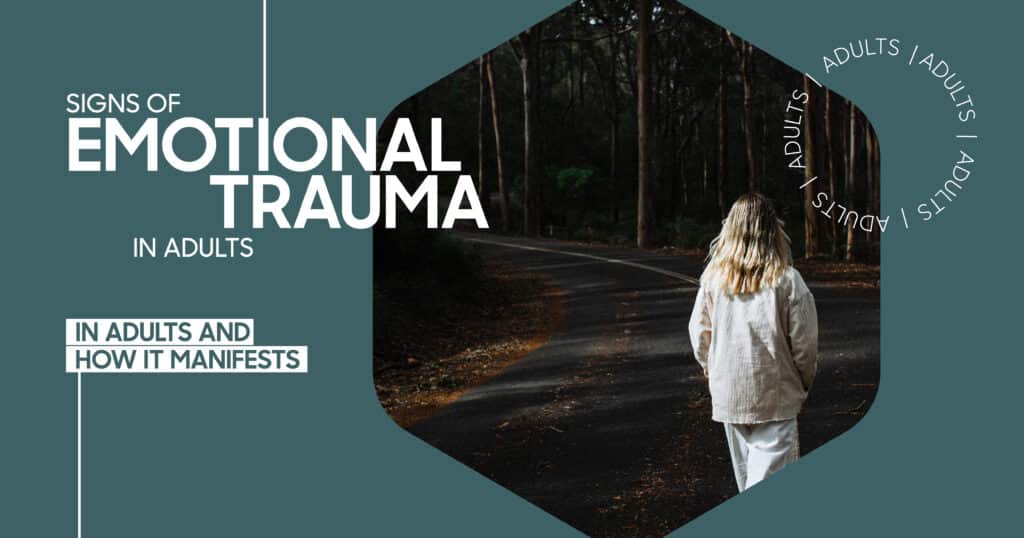That knot in your stomach when memories recall. The panic that arrives without warning. Those relationships crises that trigger at small points. These aren’t random happenings, they’re often the impacts of trauma in your life.
While many imagine trauma happens only to others, these invisible wounds shape countless lives daily, often without recognition. Tracing these minor prints isn’t merely the care, but it’s the crucial step to freedom (many never knew existed). In this blog post, we’ll be exploring the signs of deep emotional trauma in adults. So, Let’s Begin!
What Causes Emotional Trauma in Adults?
Well, on a broader spectrum, it is said that trauma primarily comes from major, tragic events, but that’s half the truth. We all know that natural disasters, violence, or combat create trauma, but research has caught up with what many therapists have seen for years: seemingly “smaller” life events can hit just as hard. Like: Losing a job, dealing with toxic work stress, receiving scary health news, emotional neglect growing up, betrayal by someone you trusted, and even watching loved ones suffer, all these can leave lasting trauma marks and make you live in an emotionally traumatized state.
Recent neurobiological research shows something amazing: what makes something traumatic isn’t really about how “bad” an event objectively was. It’s more about how your nervous system processes it. When something overwhelms your ability to cope or crashes against your basic sense of safety, trauma responses can develop, sometimes showing up years after the original hurt.
Treat Mental Health Texas
Signs of Emotional Trauma in Adults You Shouldn’t Ignore
You know what, Trauma often works behind the scenes. Many people carrying emotional wounds don’t connect their current struggles with things that happened before. Here are some signs of emotional trauma in adults worth paying attention to:
Emotional and Psychological Symptoms
Trauma shapes the intense emotional patterns. Some of the prominent emotional trauma symptoms are listed below:
- Wild emotional swings. One minute intensely feeling everything, the next feeling nothing
- Constant anxiety or fear that doesn’t match what’s happening now
- Memories or flashbacks that disturb you, making the past feel weirdly present
- Always being on high alert, like you’re constantly watching for danger
- Just not enjoying things that used to bring you happiness
- Deep shame and that nagging feeling that something’s fundamentally wrong with you
- Getting completely overwhelmed by emotions that feel impossible to manage
- Trouble sleeping, nightmares, insomnia, or lying awake hyper-alert
These psychological trauma signs usually show up together and can seriously mess with your relationships and quality of life (Be aware and give attention!).
Behavioral Patterns and Coping Mechanisms
Our bodies and minds try to protect us from trauma in ways that make perfect sense, but often create new problems:
- Avoiding anything that might trigger painful memories
- Relationship patterns that swing from total isolation to desperate dependency
- Using substances, food, shopping, or other quick fixes to numb the pain
- Becoming a people pleaser or a perfectionist to create some sense of control
- Struggling with boundaries, either letting everyone in or keeping everyone out
- “Freezing up” or checking out mentally when emotions get too intense
- Somehow sabotaging good things in your life because they don’t feel “right” or deserved
These responses made complete sense as survival tactics, even though they might be limiting your life now.
Deep Trauma Vs. Everyday Stress: How to Tell the Difference
We can’t deny that everyone deals with stress, but trauma has its own severe impacts. Regular stress usually:
- Has an obvious cause you can point to
- Gets better once the problem is solved
- Responds when you take care of yourself in basic ways
- Doesn’t change how you fundamentally see yourself or others
Trauma is different:
- It sticks around long after the danger’s gone
- Mess with your core sense of safety, identity, or worth
- Creates body responses that feel completely out of your control
- Often shows up as physical problems doctors can’t seem to fix
This difference helps explain why standard “just breathe and think positive” stress advice falls flat for trauma survivors.
Treat Mental Health Texas
Long-Term Effects of Untreated Psychological Trauma
Recent research has completely changed how we understand trauma’s effects on both mind and body:
- Higher chances of developing autoimmune conditions and chronic illnesses through inflammation pathways
- Mental health challenges beyond just PTSD, depression, and anxiety often tag along
- Brain fog, memory problems, and trouble with planning and decision-making
- Relationship struggles, especially with trust and attachment
- Higher risk of ending up in more traumatic situations again
- Career and financial struggles from the trauma’s impact on decision-making
The groundbreaking ACE (Adverse Childhood Experiences) Study confirmed what many suspected: these aren’t just “all in your head” issues. Trauma literally changes how your body and brain work unless you get the right kind of help.
Pathways to Healing: What Recovery Can Look Like
Trauma recovery has come a long way. Modern approaches recognise that healing takes more than just talking about what happened:
- Practice to regulate your nervous system through Somatic Experiencing (SE)
- Consider processing traumatic memories with therapies like EMDR, which work with how memories are stored in your brain
- Building up internal resources and stability before diving into the hard stuff
- Addressing both emotional and physical aspects because trauma lives in the body, too
- Rebuilding your relationship with yourself and others through safe connection experiences
- Finding meaning and sometimes even unexpected growth through your healing journey
Need Help Navigating Emotional Trauma? Treat Mental Health Texas Is Here
We have to admit, looking into trauma takes actual courage. At Treat Mental Health Texas, there’s a team of professionals who carefully interpret trauma’s complicated nature and offer the most effective, compassionate paths towards healing.
Be sure to plan your appointment if you are experiencing any signs of psychological trauma or having trouble with emotional trauma symptoms. Witness the safe space that makes you feel valued. With customised treatment plans to suit your situation and needs, you can return to a stress-free normal living.
Reach out to Treat Mental Health Texas or browse the website to schedule a confidential conversation. Your past matters, but it doesn’t have to direct your future life.
Treat Mental Health Texas
FAQs
What are the signs of emotional trauma?
The human body is designed in a way that it responds to trauma by expressing panic attacks, sleepless nights, and it does not even warn you. This sort of unexplained ache, the memories that ambush you, they’re not glitches. They’re echoes.
How does trauma affect adults?
It rewires your instincts, making trust feel dangerous, rest feel impossible, and self-doubt feel like truth. The past doesn’t just haunt you; it scripts your present.
Can emotional trauma cause physical symptoms?
Yes. Migraines, gut issues, a heart that races as if danger never left, your body remembers what your mind tries to forget.
What’s the best way to heal from trauma?
Safety first. A trauma-informed therapist helps you relearn calm, then gently revisit wounds not to relive them, but to finally outgrow them.
How can therapy help with emotional trauma?
It gives you what trauma stole: a steady hand to hold while you relearn safety, rewrite old stories, and reclaim the life that’s been waiting for you.










